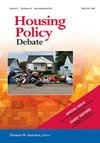等待革命的研究议程
IF 2.9
3区 经济学
Q2 DEVELOPMENT STUDIES
引用次数: 2
摘要
摘要本文回应了David Imbroscio的《超越机会囤积:作为城市不平等的一种解释来质疑其极限》,提出了研究人员如果从黑人认识论的角度考虑机会囤积的概念,可能会问的问题。我建议,调查对囤积的文化、认知和心理承诺,将其作为白人和种族资本主义的一个关键特征,可能会深入了解如何摆脱并最终废除这些制度。本文章由计算机程序翻译,如有差异,请以英文原文为准。
A Research Agenda Pending Revolution
Abstract This essay responds to David Imbroscio’s “Beyond Opportunity Hoarding: Interrogating Its Limits as an Account of Urban Inequities” by suggesting questions that researchers might ask about opportunity hoarding if they considered the concept through a Black epistemic lens. I propose that investigating cultural, cognitive, and psychological commitments to hoarding as a key feature of Whiteness and racial capitalism might lead to insights on how to divest from and ultimately dismantle these systems.
求助全文
通过发布文献求助,成功后即可免费获取论文全文。
去求助
来源期刊

Housing Policy Debate
Multiple-
CiteScore
5.40
自引率
17.20%
发文量
68
期刊介绍:
Housing Policy Debate provides a venue for original research on U.S. housing policy. Subjects include affordable housing policy, fair housing policy, land use regulations influencing housing affordability, metropolitan development trends, and linkages among housing policy and energy, environmental, and transportation policy. Housing Policy Debate is published quarterly. Most issues feature a Forum section and an Articles section. The Forum, which highlights a current debate, features a central article and responding comments that represent a range of perspectives. All articles in the Forum and Articles sections undergo a double-blind peer review process.
 求助内容:
求助内容: 应助结果提醒方式:
应助结果提醒方式:


